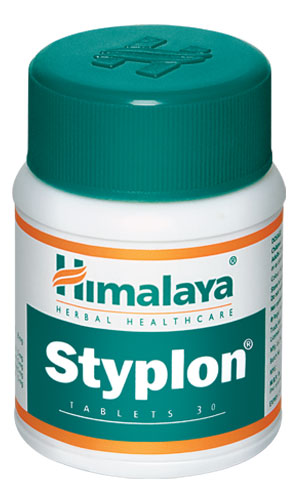Note: This is a project under development. The articles on this wiki are just being initiated and broadly incomplete. You can Help creating new pages.
Difference between revisions of "Styplon"
(→Key ingredients) |
|||
| (One intermediate revision by the same user not shown) | |||
| Line 1: | Line 1: | ||
[[File:Styplon.jpg|thumb|right|''Styplon'']] | [[File:Styplon.jpg|thumb|right|''Styplon'']] | ||
| − | Styplon’s hemostatic property controls local tissue hemorrhage effectively. The natural ingredients are also vasoconstrictors, which stops capillary blood flow. | + | ==Action== |
| + | Hemostatic: Styplon’s hemostatic property controls local tissue hemorrhage effectively. The natural ingredients are also vasoconstrictors, which stops capillary blood flow.<ref name="The Himalaya Drug Company"/> | ||
| − | + | ==Indications== | |
| + | *Bleeding gums | ||
| + | *Bleeding hemorrhoids (painful, swollen veins towards the end of the rectum or anus) | ||
| + | *Epistaxis (nosebleed) | ||
| + | *In gynecological bleeding conditions, which include abnormal uterine bleeding, spotting, post intrauterine contraceptive device (IUCD) bleeding | ||
| + | *Hematuria (presence of blood in urine) | ||
| + | *As an adjuvant in hemoptysis (blood-stained sputum) | ||
| − | + | ==Key ingredients== | |
| + | *Ayurveda texts and modern research back the following facts: | ||
| + | *Indian Gooseberry ([[Amalaki]]) has hemostatic, anti-inflammatory and antioxidant properties, which control local tissue hemorrhage, inflammation and oxidative tissue damage respectively. | ||
| − | + | *Red Coral ([[Pravala pishti]]) is a styptic commonly used in bleeding disorders. | |
| + | *Indian Sarsaparilla ([[Anantamul]]) is a vasoconstrictor that stops capillary blood flow. | ||
| − | + | *Lodh Tree ([[Lodhra]]) helps in wound healing. | |
| − | + | ==Directions for use== | |
| + | *Please consult your physician to prescribe the dosage that best suits your condition. | ||
| − | + | ==Side effects== | |
| + | *Styplon is not known to have any side effects if taken as per the prescribed dosage. | ||
| − | + | ==References== | |
| + | <references> | ||
| + | <ref name="The Himalaya Drug Company">Products of the Himalaya Drug Company</ref> | ||
| + | </references> | ||
[[Category:Proprietary Ayurvedic Medicine]] | [[Category:Proprietary Ayurvedic Medicine]] | ||
[[Category:Himalaya Drugs Company]] | [[Category:Himalaya Drugs Company]] | ||
Latest revision as of 17:59, 1 October 2018
Action
Hemostatic: Styplon’s hemostatic property controls local tissue hemorrhage effectively. The natural ingredients are also vasoconstrictors, which stops capillary blood flow.[1]
Indications
- Bleeding gums
- Bleeding hemorrhoids (painful, swollen veins towards the end of the rectum or anus)
- Epistaxis (nosebleed)
- In gynecological bleeding conditions, which include abnormal uterine bleeding, spotting, post intrauterine contraceptive device (IUCD) bleeding
- Hematuria (presence of blood in urine)
- As an adjuvant in hemoptysis (blood-stained sputum)
Key ingredients
- Ayurveda texts and modern research back the following facts:
- Indian Gooseberry (Amalaki) has hemostatic, anti-inflammatory and antioxidant properties, which control local tissue hemorrhage, inflammation and oxidative tissue damage respectively.
- Red Coral (Pravala pishti) is a styptic commonly used in bleeding disorders.
- Indian Sarsaparilla (Anantamul) is a vasoconstrictor that stops capillary blood flow.
- Lodh Tree (Lodhra) helps in wound healing.
Directions for use
- Please consult your physician to prescribe the dosage that best suits your condition.
Side effects
- Styplon is not known to have any side effects if taken as per the prescribed dosage.
References
- ↑ Products of the Himalaya Drug Company
